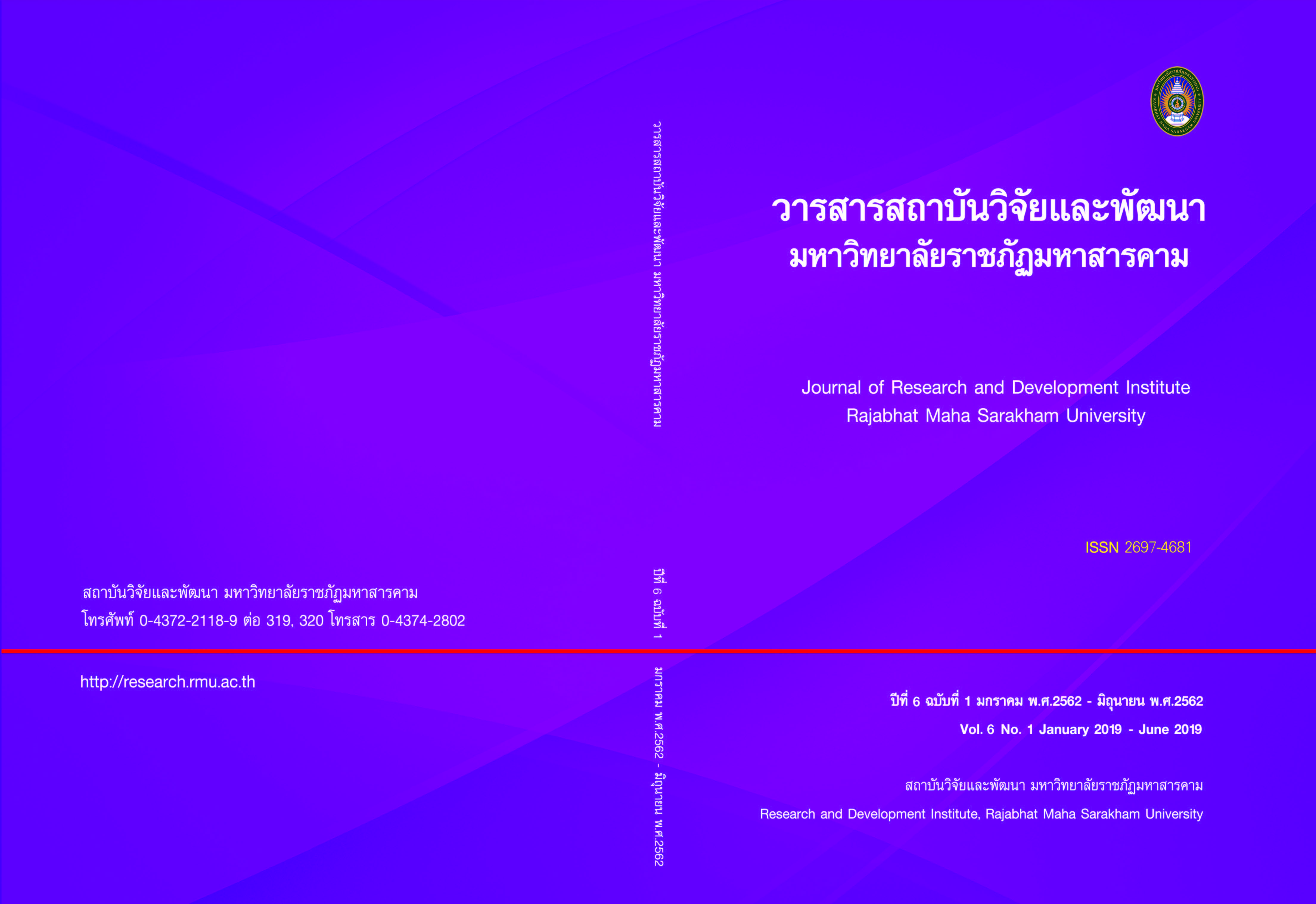English Language Learning Strategies Employed by Thai Library Science Students: A Case Study of Students at Rajabhat Maha Sara Kham University
Keywords:
Language learning strategy, English as Foreign Language (EFL), Library science studentAbstract
The main objectives of this study were aimed at investigating English language learning strategies used by Thai library science students and their opinions toward language learning strategies in English learning context. The samples consisted of 88 undergraduate students majoring in Library Education and English at the Faculty of Education at Rajabhat Maha Sarakham University, which purposively grouped according to years of study. The survey questionnaire on language learning strategy, adapted from Prakongchati (2007) was applied to collect data. Data analysis combined with descriptive analysis to examine means and standard deviation and content analysis for data gathering from one-on-one interview. The quantitative results demonstrated that Thai library science students used most of language learning strategies at moderated level, with a few at a high level. Considering with qualitative data, most of Thai library science students realized that English learning played a very important role in daily life, but they did not receive any formal training how to use appropriate language learning strategies in their classroom.
References
Boonkongsaen, N., & Intaraprasert, C. (2014). “Use of English vocabulary learning strategies by Thai tertiary- level students in relation to fields of study and language-learning experiences”. English Language Teaching, 7 (5) : 59-70.
Crystal, D. (1997). English as a global language. Cambridge: Cambridge University Press.
Deeyu Srinarawat (1996). “English as an international language: factors that should be considered in teaching and learning”. Domethat Journal, 14 (2), p.122-128. [In Thai]
Faculty of Education, Rajabhat Maha Sarakham University (2013).“Bachelor of Education Program School of Librarians and English Studies (5 years) Double majors (New Curriculum 2013) ”. Rajabhat Maha Sarakham University. [In Thai]
Gardner, R.C. (1985). Social psychology and second language learning : The role of attitudes and motivation. London Ontario : Edward Arnold.
Hyland, F. (2004). “Learning autonomously : Contextualizing out-of-class English language learning”. Language Awareness, 13 (3) : 180-202.
Intaraprasert, C (2000). Language learning strategies employed by engineering students learning English at the tertiary level in Thailand. Unpublished Ph.D dissertation, University of Leeds, England.
Kanoksilapatham, B. (2010). Examining English pronunciation competence of Thai teachers: Word stress assignment. In G. Papanikos & Nicholas C. J. Pappas (Eds.), Horizons in Education (pp. 467-480). Athens: Athens Institute for Education and Research (ATINER).
Lin, A.M.Y. (1996) “Bilingualism or linguistic segregation? Symbolic domination, resistance and code switching in Hong Kong schools”. Linguistics and Education 8 : 49–84.
McGroatry, M., & Oxford, R. (1990). Language Learning Strategies: An introduction and Two related studies. In Padilla, A.M. et al. (Eds.). Foreign Language Education: Issues and Strategies. (pp. 56-74). CA: SAGE Publications.
Methitham : & Chamcharatsri : B. (2011). “Critiquing ELT in Thailand: A reflection from history to practice”. Journal of Humanities, Naresuan University, 8 (2) : 57-68.
Noom-ura, S (2013). “English-teaching problems in Thailand and Thai teachers professional development needs”. English Language Teaching, 6, (11) : 139-147.
Nunan, D & Richards, J.C. (2015). Language learning beyond classroom. New York: Routlege Press.
O’Malley, J.M. & A.U. Chamot. (1990). Learning strategies in Second Language Acquisition. Cambridge: Cambridge University Press
Oxford, R. L. et al. (2014). “The learning strategy prism: Perspectives of learning strategy experts”. System. 43 : 30-49.
Oxford, R., & Burry-Stock, J. A. (1995). “Assessing the use of language learning strategies worldwide with the ESL/EFL Version of the Strategy Inventory for Language Learning (SILL) ”. System, 23 (1) : 1–23.
Oxford, R.L. (1990). Language learning strategies: What every teacher should know. New York: Newbury House Publications.
Prakongchati, N (2012). “The use of language learning strategies in English learning contexts”. Journal of Humanities and Social Sciences, Khon Kaen University, 29 (1) : 66-87. [In Thai]
Prakongchati, N. (2007). Factors related to the language learning strategy use of Thai university freshmen. Unpublished PhD. Dissertation, Suranaree University of Technology, Thailand. [In Thai]
teaching and learning in Thailand. [Online] https://pioneer.chula.ac.th/~pkanchan/doc/EnglProfLearnhailand.doc [8 April 2001] Rubin, J. (1975). “What the Good Language Learner” can teach us”. TESOL Quarterly, 9 (1) : 41-50. Songsri Soranastaporn (2017). “DIRECT LANGUAGE LEARNING STRATEGIES OF THAI LEARNERS IN THAILAND 4.0”. Journal of Thonburi University, 26 (11) : 10-25. [In Thai]
Tavakoli, N., Shakeri, N., & Granbarzadeh, T. (2016). Language learning beyond the classroom. JIEB, 4 : 153-161.
Wiriyachitra, A. (2002). “English-language teaching and learning in Thailand in this decade”. Thai TESOL Focus, 15 (1) : 4-9.
Wongsothorn, A. (1996). National profiles of language education. Chulalongkorn University Institute: Bangkok. [In Thai]
Yap, S. L. (1998) Out-of-class use of English by secondary school students in a Hong Kong Anglo-Chinese school. Unpublished M.A. Thesis, University of Hong Kong.
Downloads
Published
How to Cite
Issue
Section
License
Articles that are published are copyrighted by the authors of the articles







